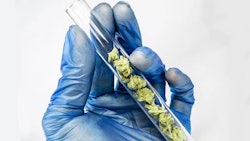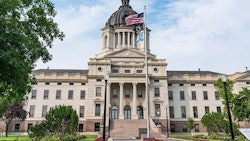
The federal government has recently approved several pieces of legislation in response to the coronavirus pandemic, including nearly $2 trillion in economic stimulus funding to bolster small businesses and the agriculture industry.
While marijuana businesses are exempt from any benefits of the package due to their federally illegal status, the stimulus funds could be a life saver for hemp farmers and related small businesses in an industry that is just finding its bearings.
“There are a lot of pools of money that we believe can be accessed by hemp farmers and companies in this space,” says Jonathan Miller, general counsel for the U.S. Hemp Roundtable. “We really feel with access to these stimulus dollars, the industry will still be thriving as we move into economic recovery.”
Below, Hemp Grower has compiled a guide for hemp farmers and other industry businesses on what their benefits are and how to access them.
Who Can Apply
The Small Business Administration (SBA) has clarified that businesses producing or selling hemp and hemp-derived products legally may be eligible for SBA loans, says Shawn Hauser, chair of the hemp and cannabinoid practice group at Vicente Sederberg LLP, which put together a comprehensive guide to the new package for cannabis businesses.
The SBA’s clarification is a blanket statement, though. And while most hemp businesses should be eligible, some—particularly those dealing with cannabidiol (CBD)—may run into some obstacles when applying for benefits, as the U.S. Food and Drug Administration (FDA) has not yet approved any over-the-counter CBD product.
“I think there will be some case-by-case, fact-specific determinations here,” Hauser says. “There may be certain scrutiny given to businesses that are selling CBD products specifically as far as banks and their due diligence process as to federal legality.”
Hauser says companies that have made health claims on CBD product labels are most susceptible to scrutiny, as the FDA has a history of taking direct action against companies that do so.
In addition, Hauser and Miller say businesses that handle both hemp and marijuana may have some challenges obtaining benefits, as marijuana isn’t eligible for the stimulus package.
However, Hauser advises borrowers check in with their local lenders who are participating in the programs before making any assumptions.
What the CARES Act Means for Eligible Businesses
Perhaps the most significant portion of the federal stimulus package is H.R. 748, or the Coronavirus Aid, Relief and Economic Security (CARES) Act.
The CARES Act dedicates $350 billion to support small businesses with fewer than 500 employees. Parts of this bill supports the Paycheck Protection Program, the Economic Injury Disaster Loan Program (EIDLP) and the Emergency Grant Program.
Highlights of the Paycheck Protection Program include:
- Small businesses can apply for loans to cover payroll costs and salaries, costs related to continuation of healthcare benefits, mortgage or rent payments, utilities and interest on other debt incurred before Feb. 15 of this year. The borrower must provide certification on what it will use the money for.
- The application requires companies to confirm they’re “not engaged in any activity that is illegal under federal, state, or local law,” so CBD companies may not be eligible, Hauser says. For those who aren’t well-versed in the various levels of regulations that adhere to them, Hauser advises consulting with legal counsel to confirm any determination of legality of their products under the Federal Food Drug and Cosmetic Act, and applicable state laws.
- The covered period is between Feb. 15 and June 30.
- The loan amount is limited to up to $10 million for companies that have existed prior to 2019. For others, the limit is 2.5 times the average amount of payroll costs in a one-year period.
- Apply for a loan through any existing SBA 7(a) lender or any federally insured depository institution, federally insured credit union and participating Farm Credit System institution. Consult with your local lender to see if it is participating in the program.
- A sample application form is available online.
- Loans will be available starting April 3.
- Loans may be partially forgiven if employers maintain their payroll during the covered period. To seek forgiveness, the borrower must submit an application that verifies payments.
- For more details, visit the SBA website.
As part of the stimulus package, the EIDLP has been revised to include the coronavirus as a qualifying disaster. The EIDLP, available through the SBA, provides eligible small businesses with working capital loans of up to $2 million in the event of “substantial economic injury due to a declared disaster.”
More highlights of the expanded EIDLP include:
- The loans can be used for fixed debts, payroll, accounts payable and other bills that cannot be paid due to impacts from the coronavirus.
- The covered period is between Jan. 31 through December 2020.
- Applications are available online through the SBA.
- Collateral is required for all loans over $25,000 and personal guarantees are required for loans over $200,000.
- Express loans of up to $25,000 are available for companies who have existing relationships with SBA Express Lenders through the Express Bridge Loan Pilot Program. See your lender for more details, or visit the program’s website.
In addition to the working capital loans under EIDLP, small businesses can also apply for advance emergency grants under the same program.
Highlights of the Emergency Grant Program include:
- Up to $10,000 is available to cover costs related to: paid sick leave for employees, maintaining payroll to retain employees, meeting increased costs as a result of interrupted supply chains, rent or mortgage payments, or repay obligations that cannot be met due to revenue losses.
- This money can be received within three days of applying.
- This money does not need to be repaid.
- Applications are available online through the SBA.
For Farmers
Farmers will also benefit from the stimulus package, though likely not as directly as businesses.
The CARES Act allocated $44 billion toward agriculture businesses, including:
- $9.5 billion to the U.S. Department of Agriculture (USDA) to provide financial support to farmers and ranchers growing specialty crops.
- $14 billion to the Commodity Credit Corporation to support programs to assist agricultural producers.
- $20.5 million of lending for the USDA Rural Development Business and Industry Loan Guarantee Program. Eligible businesses include businesses with facilities located in rural areas that save or create jobs. Most types and sizes of businesses are eligible. For more information, visit the USDA’s Rural Development website.
- Temporary extensions on repayment of commodity marketing assistance loans until Sept. 30, 2020.
A majority of this funding will be directed toward state departments of agriculture, which will then use the funds to create or bolster programs and provide additional loans, Hauser says. For more information on loan programs for farmers, visit the USDA’s website portal for farmers.
One caveat with the $9.5 billion in funding in particular is that it is designated to specialty crops. However, Hauser says that even though hemp falls under the USDA’s definition of a “specialty crop,” it is not formally considered one and may not be eligible for that portion of the funding. She says Vicente Sedenberg is working to get clarity on that issue.
Overall, many businesses are likely to find some form of relief from the federal stimulus package, and Hauser says more federally funding is likely to come as COVID-19 spreads further. Businesses should also check with their state and local governments for additional funding and loan opportunities, Hauser adds.
“I’m cautiously optimistic these programs will be a lifeline to hemp businesses,” Hauser says.























